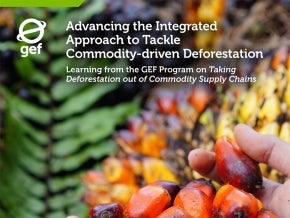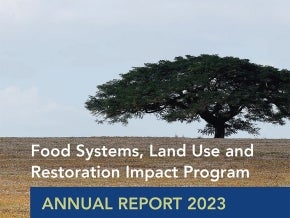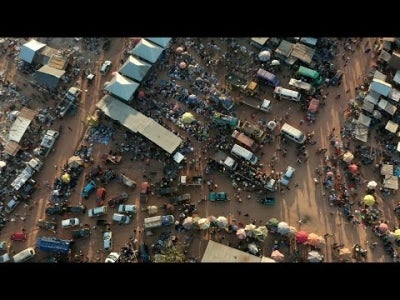
Drought and scarcity
Every year, as the month of May approaches, farmers in the Dalo commune of Central-West Burkina Faso watch the sky and hold their breath, wondering if the rains will come. This should be the onset of the short ‘wet’ season, bringing the life-giving rain without which crops will fail and grazing will disappear, causing food shortages and hardship for the people who live here. The climate in this part of the country is harsh and hot, with temperatures reaching 45 degrees Celsius, and increasingly frequent droughts during which rivers dry up completely. Under these conditions, it is not uncommon for farmers to go from having a good harvest in one year, to nothing at all the next, and, during the ‘hungry years,’ families have to sell off what few possessions they have to buy food.
For women, the immediate worry is about how to feed their families, but, their lives are also badly affected by land degradation and increasing scarcity of many other things that they rely on from nature to meet their daily needs. “We need wood for making our cook-fires, and this is becoming more and more scarce, and we have to go further to find it than before,” says Selemou Seni, the President of the Yiida Cooperative Society, a women’s group in Dalo. “Certain leaves, flowers and roots that we eat or use for traditional medicines are also getting harder to find or have even disappeared from the forest. This is a real problem because the people here are poor, and we rely on traditional medicine to treat the sick.”
The changes observed by Selemou arise from a combination of protracted drought, widespread deforestation (caused by large-scale clearing for agribusiness, and local over-harvesting), stripping of riverbanks for cultivation (due to land and water scarcity), a lack of suitable restoration measures, and increasing land-use conflicts (including between humans and wildlife) – all of which contribute to creeping desertification, poverty and food insecurity.
Cultivating women’s power
Agriculture is the mainstay of the subsistence and commercial economy in the Central-West Region. Traditionally, women do not own land, but participate in farm activities on land owned by their husbands or male relatives, according to ethnically and culturally-defined rules. If women want to cultivate land independently, they have to borrow or rent it from those who own it, and their land-use tenure arrangements can change at any time. As individuals, women also find it difficult to access adequate finance and agricultural resources, which limits their land-management options, productivity, and earning potential, and leaves them vulnerable and disempowered.
Small steps, big strides
One of the most important impacts this has had, is to increase the earning power of women, and their ability to provide enough food to meet daily needs. “We were helped to develop an irrigated field to produce rice at a site that was previously degraded and unsuitable for any sort of production. We were also trained in dry-season production techniques using other crops, and were supplied with inputs such as seeds, and organic and mineral fertilizers of good quality,” says Zenabou Kanyili, a member of the Yiida Cooperative Society. “As a result, we have produced over 600 kilograms of bulbous onion, and, in the dry season, I harvested a significant quantity of onion, sorrel and bean leaves and okra, which we use in the preparation of sauces that accompany our different local dishes. This has meant that I am spending less money on buying food, and, with the sale of surplus produce, I can save a little money for use in the dry season.”
The support of the project has also helped the Yiida Cooperative Society to achieve legal status, which has far-reaching impacts.
“Being a part of this co-operative society gives me great pride,” says Suzanne Zio, the Treasurer of the society, “Because of the support we have received, our living conditions are improving. We have set up working capital of more than 150,000 CFA (US$300), which we can use to fund future activities.” The new legal status also gives the women access to supplementary credit if needed. Suzanne adds, “We have built up knowledge and experience and have been supplied with practical things like an ox-plough and subsidized fertilizer, and this means that we can apply good farm management practices.”
Many farmers are now applying SLM technologies on their farms, such as sowing crops in planting pits (called ‘zaï’), and building stone contour bunds, to capture runoff and prevent slippage of soil. Women have also been trained to build and use energy-efficient cook-stoves, which reduces demand for firewood, and frees up some of the women’s time (which was previously spent collecting wood) to spend on other income-generation activities, such as the production of ‘soumbala’, a condiment made from ‘néré ‘(Parkia biglobosa).
Empowered through knowledge and skills, and improved status in their community, the Yiida Cooperative Society, and other women’s associations like it, is better able to provide for the food, health and educational needs of their families, and they have become better stewards of the land that supports them.
“Today we participate in community life through our presence and membership in professional and community-based organizations,” explains Zenabou. “For us, these are mechanisms through which we meet other community members, exchange experiences and participate in programmes that improve our knowledge and social and economic conditions. Before, we were women of a ‘village group’; but, now we’re a cooperative society for development, for ourselves and for our community. Our status has improved and many more opportunities are now opening up for us.”


